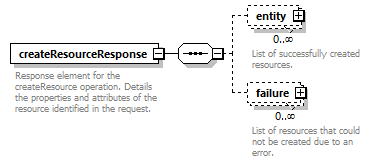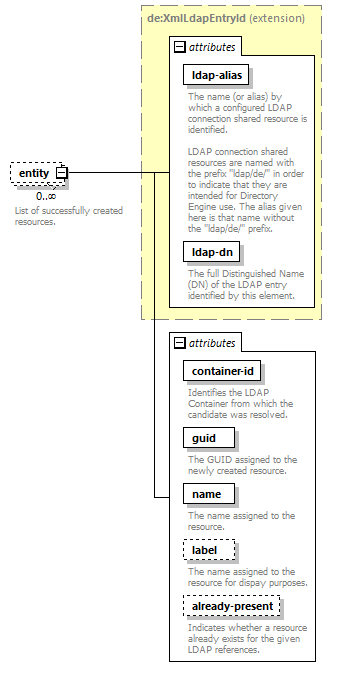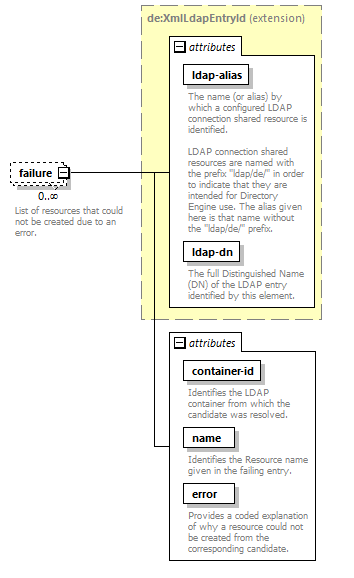| diagram |  |
||
| namespace | http://resource.api.de.bpm.tibco.com | ||
| properties |
|
||
| children | entity failure | ||
| annotation |
|
||
| source | <xs:element name="createResourceResponse"> <xs:annotation> <xs:documentation>Response element for the createResource operation. Details the properties and attributes of the resource identified in the request.</xs:documentation> </xs:annotation> <xs:complexType> <xs:sequence> <xs:element name="entity" minOccurs="0" maxOccurs="unbounded"> <xs:annotation> <xs:documentation>List of successfully created resources.</xs:documentation> </xs:annotation> <xs:complexType> <xs:complexContent> <xs:extension base="de:XmlLdapEntryId"> <xs:annotation> <xs:documentation>Identifies the candidate to which the Resource refers.</xs:documentation> </xs:annotation> <xs:attribute name="container-id" type="xs:long" use="required"> <xs:annotation> <xs:documentation>Identifies the LDAP Container from which the candidate was resolved.</xs:documentation> </xs:annotation> </xs:attribute> <xs:attribute name="guid" type="xs:string" use="required"> <xs:annotation> <xs:documentation>The GUID assigned to the newly created resource.</xs:documentation> </xs:annotation> </xs:attribute> <xs:attribute name="name" type="xs:string" use="required"> <xs:annotation> <xs:documentation>The name assigned to the resource.</xs:documentation> </xs:annotation> </xs:attribute> <xs:attribute name="label" type="xs:string"> <xs:annotation> <xs:documentation>The name assigned to the resource for dispay purposes.</xs:documentation> </xs:annotation> </xs:attribute> <xs:attribute name="already-present" type="xs:boolean" default="false"> <xs:annotation> <xs:documentation>Indicates whether a resource already exists for the given LDAP references.</xs:documentation> </xs:annotation> </xs:attribute> </xs:extension> </xs:complexContent> </xs:complexType> </xs:element> <xs:element name="failure" minOccurs="0" maxOccurs="unbounded"> <xs:annotation> <xs:documentation>List of resources that could not be created due to an error.</xs:documentation> </xs:annotation> <xs:complexType> <xs:complexContent> <xs:extension base="de:XmlLdapEntryId"> <xs:annotation> <xs:documentation>Identifies the candidate to which the failure refers.</xs:documentation> </xs:annotation> <xs:attribute name="container-id" type="xs:long" use="required"> <xs:annotation> <xs:documentation>Identifies the LDAP container from which the candidate was resolved.</xs:documentation> </xs:annotation> </xs:attribute> <xs:attribute name="name" type="xs:string" use="required"> <xs:annotation> <xs:documentation>Identifies the Resource name given in the failing entry.</xs:documentation> </xs:annotation> </xs:attribute> <xs:attribute name="error" type="de:XmlCandidateError" use="required"> <xs:annotation> <xs:documentation>Provides a coded explanation of why a resource could not be created from the corresponding candidate.</xs:documentation> </xs:annotation> </xs:attribute> </xs:extension> </xs:complexContent> </xs:complexType> </xs:element> </xs:sequence> </xs:complexType> </xs:element> |
element createResourceResponse/entity
| diagram |  |
||||||||||||||||||||||||||||||||||||||||||||||||||||||||||||||
| type | extension of XmlLdapEntryId | ||||||||||||||||||||||||||||||||||||||||||||||||||||||||||||||
| properties |
|
||||||||||||||||||||||||||||||||||||||||||||||||||||||||||||||
| attributes |
|
||||||||||||||||||||||||||||||||||||||||||||||||||||||||||||||
| annotation |
|
||||||||||||||||||||||||||||||||||||||||||||||||||||||||||||||
| source | <xs:element name="entity" minOccurs="0" maxOccurs="unbounded"> <xs:annotation> <xs:documentation>List of successfully created resources.</xs:documentation> </xs:annotation> <xs:complexType> <xs:complexContent> <xs:extension base="de:XmlLdapEntryId"> <xs:annotation> <xs:documentation>Identifies the candidate to which the Resource refers.</xs:documentation> </xs:annotation> <xs:attribute name="container-id" type="xs:long" use="required"> <xs:annotation> <xs:documentation>Identifies the LDAP Container from which the candidate was resolved.</xs:documentation> </xs:annotation> </xs:attribute> <xs:attribute name="guid" type="xs:string" use="required"> <xs:annotation> <xs:documentation>The GUID assigned to the newly created resource.</xs:documentation> </xs:annotation> </xs:attribute> <xs:attribute name="name" type="xs:string" use="required"> <xs:annotation> <xs:documentation>The name assigned to the resource.</xs:documentation> </xs:annotation> </xs:attribute> <xs:attribute name="label" type="xs:string"> <xs:annotation> <xs:documentation>The name assigned to the resource for dispay purposes.</xs:documentation> </xs:annotation> </xs:attribute> <xs:attribute name="already-present" type="xs:boolean" default="false"> <xs:annotation> <xs:documentation>Indicates whether a resource already exists for the given LDAP references.</xs:documentation> </xs:annotation> </xs:attribute> </xs:extension> </xs:complexContent> </xs:complexType> </xs:element> |
attribute createResourceResponse/entity/@container-id
| type | xs:long | ||
| properties |
|
||
| annotation |
|
||
| source | <xs:attribute name="container-id" type="xs:long" use="required"> <xs:annotation> <xs:documentation>Identifies the LDAP Container from which the candidate was resolved.</xs:documentation> </xs:annotation> </xs:attribute> |
attribute createResourceResponse/entity/@guid
| type | xs:string | ||
| properties |
|
||
| annotation |
|
||
| source | <xs:attribute name="guid" type="xs:string" use="required"> <xs:annotation> <xs:documentation>The GUID assigned to the newly created resource.</xs:documentation> </xs:annotation> </xs:attribute> |
attribute createResourceResponse/entity/@name
| type | xs:string | ||
| properties |
|
||
| annotation |
|
||
| source | <xs:attribute name="name" type="xs:string" use="required"> <xs:annotation> <xs:documentation>The name assigned to the resource.</xs:documentation> </xs:annotation> </xs:attribute> |
attribute createResourceResponse/entity/@label
| type | xs:string | ||
| annotation |
|
||
| source | <xs:attribute name="label" type="xs:string"> <xs:annotation> <xs:documentation>The name assigned to the resource for dispay purposes.</xs:documentation> </xs:annotation> </xs:attribute> |
attribute createResourceResponse/entity/@already-present
| type | xs:boolean | ||
| properties |
|
||
| annotation |
|
||
| source | <xs:attribute name="already-present" type="xs:boolean" default="false"> <xs:annotation> <xs:documentation>Indicates whether a resource already exists for the given LDAP references.</xs:documentation> </xs:annotation> </xs:attribute> |
element createResourceResponse/failure
| diagram |  |
||||||||||||||||||||||||||||||||||||||||||||||
| type | extension of XmlLdapEntryId | ||||||||||||||||||||||||||||||||||||||||||||||
| properties |
|
||||||||||||||||||||||||||||||||||||||||||||||
| attributes |
|
||||||||||||||||||||||||||||||||||||||||||||||
| annotation |
|
||||||||||||||||||||||||||||||||||||||||||||||
| source | <xs:element name="failure" minOccurs="0" maxOccurs="unbounded"> <xs:annotation> <xs:documentation>List of resources that could not be created due to an error.</xs:documentation> </xs:annotation> <xs:complexType> <xs:complexContent> <xs:extension base="de:XmlLdapEntryId"> <xs:annotation> <xs:documentation>Identifies the candidate to which the failure refers.</xs:documentation> </xs:annotation> <xs:attribute name="container-id" type="xs:long" use="required"> <xs:annotation> <xs:documentation>Identifies the LDAP container from which the candidate was resolved.</xs:documentation> </xs:annotation> </xs:attribute> <xs:attribute name="name" type="xs:string" use="required"> <xs:annotation> <xs:documentation>Identifies the Resource name given in the failing entry.</xs:documentation> </xs:annotation> </xs:attribute> <xs:attribute name="error" type="de:XmlCandidateError" use="required"> <xs:annotation> <xs:documentation>Provides a coded explanation of why a resource could not be created from the corresponding candidate.</xs:documentation> </xs:annotation> </xs:attribute> </xs:extension> </xs:complexContent> </xs:complexType> </xs:element> |
attribute createResourceResponse/failure/@container-id
| type | xs:long | ||
| properties |
|
||
| annotation |
|
||
| source | <xs:attribute name="container-id" type="xs:long" use="required"> <xs:annotation> <xs:documentation>Identifies the LDAP container from which the candidate was resolved.</xs:documentation> </xs:annotation> </xs:attribute> |
attribute createResourceResponse/failure/@name
| type | xs:string | ||
| properties |
|
||
| annotation |
|
||
| source | <xs:attribute name="name" type="xs:string" use="required"> <xs:annotation> <xs:documentation>Identifies the Resource name given in the failing entry.</xs:documentation> </xs:annotation> </xs:attribute> |
attribute createResourceResponse/failure/@error
| type | XmlCandidateError | ||||||||||||
| properties |
|
||||||||||||
| facets |
|
||||||||||||
| annotation |
|
||||||||||||
| source | <xs:attribute name="error" type="de:XmlCandidateError" use="required"> <xs:annotation> <xs:documentation>Provides a coded explanation of why a resource could not be created from the corresponding candidate.</xs:documentation> </xs:annotation> </xs:attribute> |
WSDL documentation generated by XMLSpy WSDL Editor http://www.altova.com/xmlspy